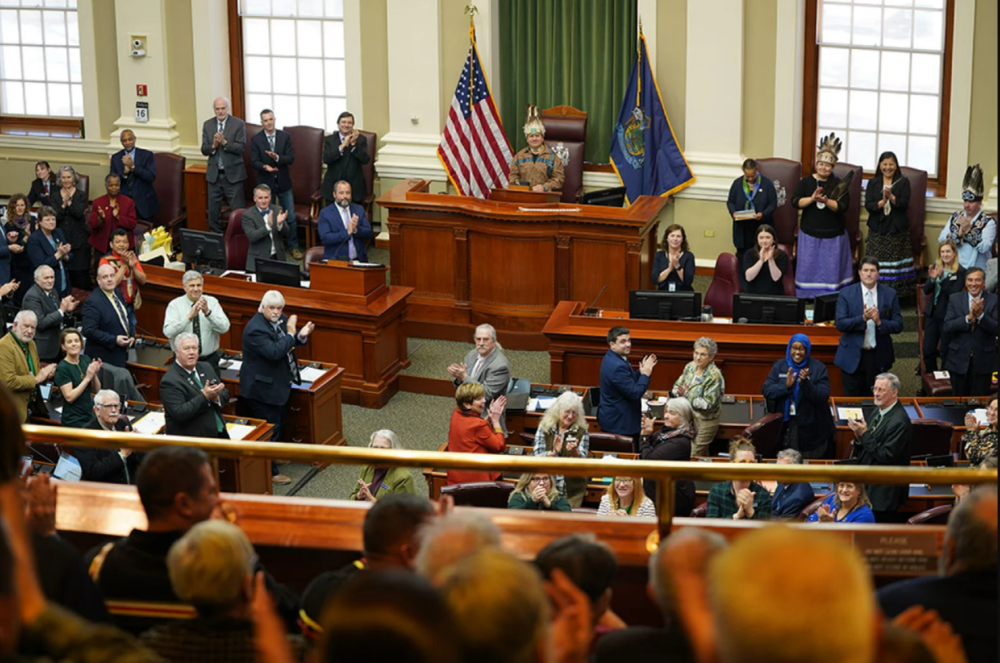Advertisement
Wounds old — and new — spotlighted in historic tribal address to Maine Legislature

Collaboration, self-determination and progress.
Those were the overarching themes from tribal leaders Thursday when they each spoke to a joint session of the Maine Legislature for just the second State of the Tribes address in state history. In many ways the address mirrored the first one that took place 21 years ago. This time, however, the tribes addressed state lawmakers who are far more receptive to their main goal — greater self-governance — than the legislators who preceded them.
Donna Loring, a former tribal representative from the Penobscot Nation, acknowledged that shift as she watched the address as a guest for Maine Public’s broadcast of the event. However, when asked by host Jennifer Rooks how things have changed since the last time the tribes spoke to the Legislature, Loring offered a sobering assessment.
“The issue that we face every year — every other year, I guess — is basically that if one branch of government supports us and works with us, another branch goes against us,” she said.
Loring’s remarks were a reference to Democratic Gov. Janet Mills. The governor was not mentioned during the tribal leaders’ speeches and she did not attend them in-person, citing an unspecified scheduling conflict. By contrast, tribal leaders repeatedly thanked Democratic House Speaker Rachel Talbot Ross, Senate President Troy Jackson and 2nd District U.S. Rep. Jared Golden, who attended the event Thursday.
But Mills remains a central figure in the furthering, or hindering, of the tribes’ main objective: overhauling a 1980 settlement agreement that the tribes view as restrictive and paternalistic, especially when compared to the rights of more than 500 federally recognized tribes across the U.S.
In Mills’ view, the Wabanaki have made more progress in the “past four years than the past 40” and they’ve done so with her help. She supported or helped negotiate bills that created the nation’s strictest environmental standards on waterways used for tribal sustenance fishing, granted tribes exclusive access to offer online sports betting in Maine, banned Indian mascots in Maine schools and exempted tribal members from some state taxes.
However, last year the governor used two of those advancements as leverage to block a sweeping bill that the tribes viewed as finally delivering self-governance parity with their counterparts in other states.
Tribal leaders have not forgotten. While they’ve expressed a willingness to work with the Mills administration to change sections of the settlement agreement, they’ve also made it clear that they will not give up on more sweeping changes to it. Absent a bipartisan coalition in the Legislature that can bypass a gubernatorial veto, Mills, recently elected to second term, stands in the way of that goal.
“We are capable of self-governance, and should be treated as partners rather than threats to the future of this state,” Penobscot Nation Chief Kirk Francis said during his speech. “We want a relationship with the state government that is based on mutual trust, fidelity and respect.”
While Mills did not attend the address, she invited tribal leaders to meet with her afterwards. They declined.
Loring, who briefly served as Mills’ senior advisor on tribal affairs, described the governor’s absence as “disrespectful to the chiefs.”
Passamaquoddy tribal historian Donald Soctomah, who joined Loring as a guest on the Maine Public broadcast, said it would have been a “step forward” if Mills had attended.
“The whole state of Maine would have seen this and would have looked for a brighter future, a relationship that we're really working towards,” he said. “And I think that's important, the visual part of it.”
Asked what she thought of the governor’s invitation to meet with her after the tribal address, Loring saw another affront.
“What I think of that is she's sending the message that I'm willing to hear you on my terms. I'm not going to go and listen to what you have to say in the House, under the House's terms. But you come to my office, and maybe we can talk,” she said. “To me that’s a controlling element. And the tribes are, I don't believe, interested in that sort of dialogue.”
This story is a production of the New England News Collaborative. It was originally published by Maine Public.
